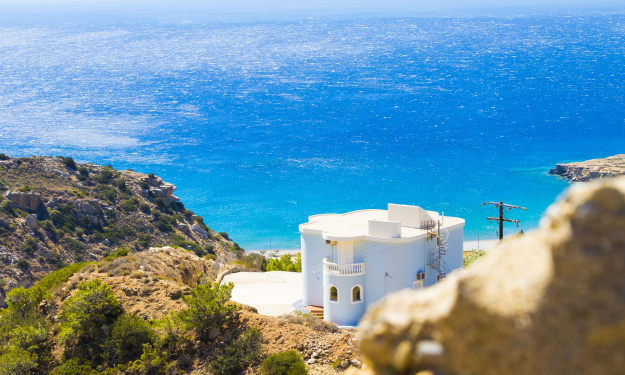Eléni & M Move to Athens - Part 10
Harmony Forever Lost

This new series has its history in the form of several short stories, several poems, and a 13-part series that is linked at the bottom via Part 9 of this series. Anthi Psomiadou has graciously agreed—her comments are proof—to appear as a fictional character in this new series, where she represents the real Greek soul of the story apart from Goddess Athena, of course.
Crete is the largest and most populous (around 635,000 people) of the Greek islands and the fifth largest island in the Mediterranean Sea, bounding the southern border of the Aegean Sea. Crete rests around 160 km (99 miles) south of the Greek mainland and has an area of 8,336 km² (3,219 miles²) and a coastline of 1,046 km (650 miles). Wikipedia
The sea looked calm to all five of us, yet within it were stories unfolding day and night, countless others that had passed, most of them never memorized, some of them forgotten, and a few of them remembered as long as there was someone still alive with their traces still flowering from time to time like the memory of a lost love or the pain of a sword through the heart.
Since we were connected through our minds, Goddess Athena, Eléni and Anthi also felt the almost sudden suffering that Patrick and M, Patrick and I, were feeling as we contemplated all the blueness before us from sky to sea and to eyes in the case of our Athena. This alluring azure horizon would have been to die for had it not also been a Greek tragedy for too many Greeks and another distinct group of individuals.
We were one person once, Patrick and I, Patrick M as one individual, that is until that individual decided to write a novel titled, Unfinished Business (2012), which was the second part of the previous novel titled, Forty-Four Forever (2009). A part of Unfinished Business took place in Crete where the Nazis obliterated over 2,000 years of Jewish life within a short span of time, especially in 1944. Part of me disagreed as to the way in which the novel was unfolding, creating two narrators for a lack of a better word. Two writers emerged when the novel was finished, one somewhat forgiving and generally calm, and one unforgiving and unremittingly angry at everything Nazi and thus German in the 20th century. We still wrote as one after that, but a markedly different style emerged as the years went by, which seems to have peaked when Patrick M became Patrick and M on Medium and also Vocal.
Focusing only on the Crete part of Unfinished Business, the second writer, M, myself, already the main one, decided to avenge the mass murder of both Cretans and the Jews among them by killing as many German tourists as he could, without being caught, of course. Louis Sasportas, the main character of both novels, finds an ingenious way to carry out his plan, albeit hurting the island’s tourism industry, but compensating every declared loss more than twofold, so that no one really complains about the missing Germans, save the newspapers and Germany, of course.
To “memorialize” the loss of the tourist Germans, Sasportas sinks the Nacht und Licht (Night and Light)—the yacht that he used to show German tourists around the island before running them over as they swam in the Cretan waters—sinking it under the moonlight and the shining stars of June 9, 1999 at a special spot, the stain where the yacht went down becoming a flowered reminder of all the lives that were lost on that day, 55 years earlier, when the German Nazis shipped all the island’s 276 remaining Jews to their deaths in the concentration camps. Luckily, a British submarine sunk the boat as soon as it left Crete, affording its human cargo a burial at sea instead of the usual gas and fire. Sasportas even trades the entirety of his Nacht Yacht fleet for a fishing boat, hoping to catch something worthwhile.
The part of me that is now Patrick thought that it was too brutal to kill innocent German tourists for events that had occurred over half a century before, forgetting, as I reminded him in our internal conversation, that this was only fiction, that no German tourist died in Crete, whereas the German Nazis annihilated millions of real individuals, entire families, entire villages, almost the entirety of the Jews of Thessaloniki. Only the Jews of Athens escaped the Nazi evil incarnate thanks to the courage and humanity of their Christian friends who hid them in the mountains. The Greeks were but a few of the exemplary humans in that horrible war, and I never forgot it. Patrick eventually came around, but the rift between us had been cast in stone if not iron.
Goddess Athena’s blue eyes darkened and we all had to hug her to bring their light back. She had already learned about the atrocities we humans were capable of, but not in any meaningful details. She looked at Patrick and me, trying to smile, before kissing each one of us on the mouth. She then kissed Eléni and Anthi and told us all in our minds that she was still happy to have been awaken no matter all the horrors of our past. She was a Greek and Greeks never give up.
It was early afternoon when we all left the house to meet Anthi’s grandparents who could not believe their eyes when Anthi, their only granddaughter, came in with the goddess they had seen in their dreams, accompanied by my Eléni and, of course, Patrick and me, basically twins to a certain degree. Anthi introduced us as her new best friends from Athens, specifying that Athena came from an ancient line of Greeks that could be traced for at least 2,000 years. Anthi translated all their kind words, allowing us to witness the source of her inner beauty and her external one as well. Shots of tsipouro abounded, Athena doing her best to keep us sober.
We all felt joy in our minds as the evening arrived with the Moon and the stars. I have been happy since we arrived to Greece and cannot see myself ever leaving except in a coffin, and even then, my body could always be buried here, perhaps under an olive tree, or even under a stone with the inscription, M the Prick, with “Prick” highlighted for anyone who happens to read it. It could also be inscribed in Greek, though Anthi will have to tell me in a comment if Google Translate was correct with, Μ ο Πούτσος (this is the corrected version thanks to the real Anthi).
...
...
Many thanks to Anthi Psomiadou for her mindful comments and suggestions regarding this mostly Greek story. If Goddess Athena can appear to be real, then Anthi Kanéna can appear to be real as well, and if they cannot, then this fiction has failed.
...
About the Creator
Patrick M. Ohana
A medical writer who reads and writes fiction and some nonfiction, although the latter may appear at times like the former. Most of my pieces (over 2,200) are or will be available on Shakespeare's Shoes.






Comments
There are no comments for this story
Be the first to respond and start the conversation.